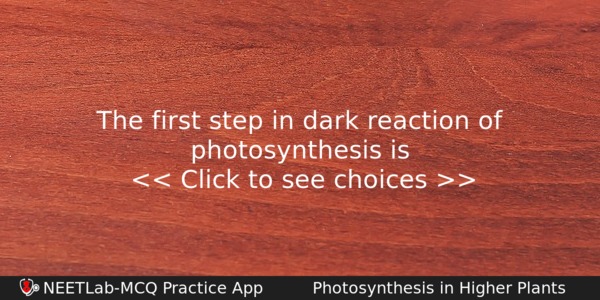| ⇦ | 
| ⇨ |
The first step in dark reaction of photosynthesis is
Options
(a) formation of ATP
(b) ionization of water
(c) attachment of CO₂ to a pentose sugar
(d) excitement of electron of chlorophyll by a photon of light
Correct Answer:
attachment of CO₂ to a pentose sugar
Explanation:
In C₃ plants, the carbon dioxide combines with ribulose 1, 5-diphosphate (RuDP) (now called RuBP – Ribulose 1, 5 bisphosphate) and gives rise to a 3-C compund, phosphoglyceric acid. It is first stable product of C₃ cycle. The process can be called as Calvin cycle.
Related Questions: - A fungal disease of the poultry is
- Equipment used for the measurement of growth in plants is known as
- With the help of DNA ligase donor DNA fragment is joined. It is called
- The scutellum obsorved in a grain of wheat or maize is comparable to which part
- The back flow of blood from the right ventricle to the right auricle is prevented by
Topics: Photosynthesis in Higher Plants
(153)
Subject: Biology
(4253)
Important MCQs Based on Medical Entrance Examinations To Improve Your NEET Score
- A fungal disease of the poultry is
- Equipment used for the measurement of growth in plants is known as
- With the help of DNA ligase donor DNA fragment is joined. It is called
- The scutellum obsorved in a grain of wheat or maize is comparable to which part
- The back flow of blood from the right ventricle to the right auricle is prevented by
Topics: Photosynthesis in Higher Plants (153)
Subject: Biology (4253)
Important MCQs Based on Medical Entrance Examinations To Improve Your NEET Score
18000+ students are using NEETLab to improve their score. What about you?
Solve Previous Year MCQs, Mock Tests, Topicwise Practice Tests, Identify Weak Topics, Formula Flash cards and much more is available in NEETLab Android App to improve your NEET score.
Share this page with your friends

Leave a Reply